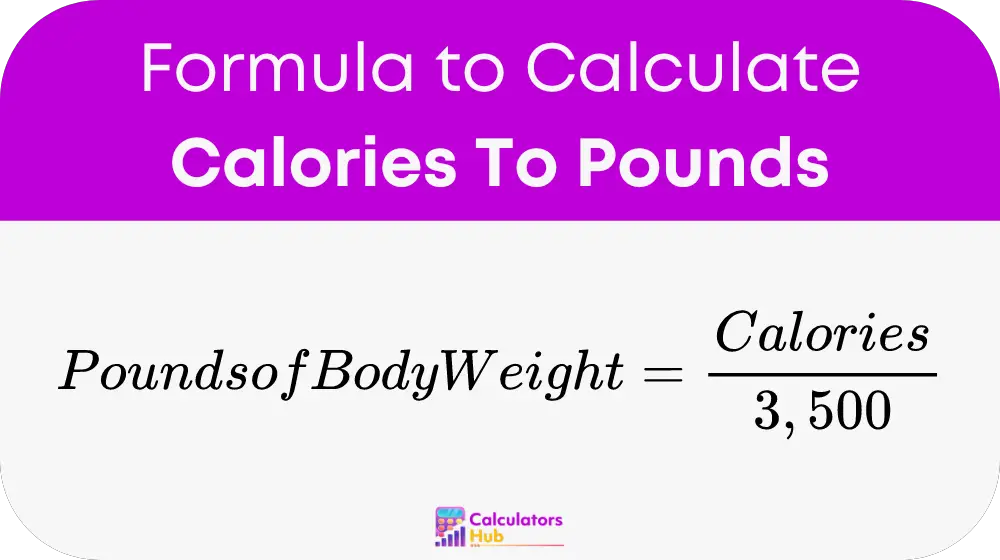The Calories to Pounds Calculator allows users to convert their caloric intake into estimated changes in body weight. It is based on the principle that a surplus of 3,500 calories is approximately equivalent to one pound of body fat. This means that if you consume more calories than your body burns, you are likely to gain weight, whereas burning more calories than you consume can lead to weight loss. This tool is particularly useful for those looking to manage their weight, whether they aim to lose, gain, or maintain it.
Formula of Calories To Pounds Calculator
To determine the pounds of body weight gained or lost based on caloric intake, use the following formula:

Where:
- 3,500 = The approximate number of calories in one pound of body fat.
This formula helps users estimate how their caloric balance affects their weight over time, allowing for better planning and adjustments in their diets.
Helpful Conversion Table
To assist users with common conversions and to simplify understanding caloric intake, here’s a table that outlines how various caloric intakes relate to weight changes. This table serves as a useful reference for those managing their diets.
| Caloric Surplus/Deficit | Estimated Weight Change (Pounds) |
|---|---|
| 500 calories | 0.14 |
| 1,000 calories | 0.29 |
| 1,500 calories | 0.43 |
| 2,000 calories | 0.57 |
| 2,500 calories | 0.71 |
| 3,500 calories | 1.00 |
| 7,000 calories | 2.00 |
| 10,500 calories | 3.00 |
This table provides quick references for estimating weight changes based on common caloric surpluses or deficits, simplifying the process of managing dietary intake.
Example of Calories To Pounds Calculator
Let’s consider an example to illustrate how the calculator works. Suppose you consume an additional 7,000 calories over a month, compared to what your body burns.
Using the formula:
Pounds of Body Weight = Calories / 3,500
Pounds of Body Weight = 7,000 / 3,500 = 2
In this scenario, consuming 7,000 extra calories would result in an estimated weight gain of 2 pounds over the month. This conversion illustrates how understanding caloric intake can influence weight management decisions.
Most Common FAQs
While the calculator provides a useful estimate, individual results may vary based on factors such as metabolism, activity level, and overall health. It is essential to consider these factors when evaluating weight changes.
Yes, the calculator can be used to determine how many calories you need to reduce from your diet to lose weight. A caloric deficit of 500 to 1,000 calories per day can lead to a healthy weight loss of about 1 to 2 pounds per week.
It is generally recommended to pursue gradual weight loss rather than rapid weight loss. Sustainable changes in diet and lifestyle tend to lead to better long-term results and overall health.